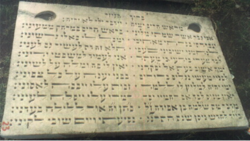Biography:Shlomo ben Afeda Ha-Kohen
Shlomo ben Afeda Ha-Kohen | |
|---|---|
 Tombstone of Solomon Afeda in the Istanbul Karaite Cemetery | |
| Born | 1826 (or 1836) Constantinople (modern-day Istanbul, Turkey) |
| Died | Constantinople |
Notable work | Yeriʻot Shelomoh, Gefen ha-Adderet, Safa Berura |
| Region | Middle Eastern philosophy |
Main interests | Religious law, Halakha |
Shlomo ben Afeda Ha-Kohen or Solomon Afeda Cohen (in Hebrew: שלמה בן אפידה הכהן) (1826–1893) was a Karaite Jewish hakham of the 19th century considered the last of the Karaite sages of Constantinople.[1]
He is famous for his two abridgements of Elijah Bashyazi's masterpiece "Aderet Eliyahu" (The Mantle of Elijah): Sefer Gefen Ha-Adderet[2] composed in 1860 and Sefer Yeriot Shelomoh[3] composed in 1862.
Solomon Cohen proposed shortening the prayers of the Karaite festivals with the aim to attract more Karaites to the temple (Knessa). He also worked as a scribe and composed many poems.[4]
Biography
His biography has been reported by Abraham Danon in 1925.[5] He was born in Constantinople in 1826 (5586 in the Hebrew calendar), of a family that emigrated from Damascus, Syria after the dispersion of the Karaite community of the city.[6] He learned to read and write in the small communal school from a teacher whose knowledge did not go beyond reading and he left school at a young age. Driven by the love of Jewish studies, he returned to student life under the supervision of his uncle Isaac Cohen who was a hakham.[5][6] After that, Solomon Cohen did not have recourse to any teacher but studied by himself all the works of the Karaite authors, both printed and manuscript, as well as the works of the Jews of Spain, which he said were "truly inspired by God".[5]
In 1860 and 1862, he wrote his most famous works on the Karaite Halakhah. Having given up his small business to devote himself definitively to his literary career, he was appointed head of the community of the Constantinopolitan Karaites, as well as officiating minister and teacher.
He resigned in 1870 and was replaced by Sabbatai Mengoubi (born about 1835).[5] The following year he left for Cairo (History of the Jews in Egypt Egypt), where he was appointed head of the local Karaite community, and remained there until 1874.[5] His successor, Sabbatai Mengoubi, resigned from his post in Constantinople and went to Cairo to take his place. Solomon Cohen then returned to Constantinople and was again appointed head of the community there (1874–1881).[5]
Family
Shlomo ben Afeda Ha-Kohen and Shlomo-Yedidia ben Eliezer Afeda Yerushalmi Kohen belong to the same family.
References
- ↑ Karaite Judaism: A Guide to the History and Literary Sources, ed. by Meira Polliack, D. Frank, p. 552
- ↑ Sefer ha-mitsṿot Gefen ha-Adderet (ספר גפן האדרת), ed. by Hayyim Levi, מרכז היהודים הקראים בישראל, Ramla, 1987
- ↑ Sefer ha-mitsṿot Yeriʻot Shelomoh (ספר יריעות שלמה), ed. by Hayyim Levi, מרכז היהודים הקראים בישראל, Ramla, 1986
- ↑ Karaitica by Michael Wilensky The Jewish Quarterly Review, New Series, Vol. 35, No. 1 (Jul., 1944), pp. 117–120
- ↑ 5.0 5.1 5.2 5.3 5.4 5.5 The Karaites in European Turkey. Contributions to Their History Based Chiefly on Unpublished Documents, The Jewish Quarterly Review, New Series, Vol. 15, No. 3 (Jan., 1925), p 354
- ↑ 6.0 6.1 Avraham Firkowicz in Istanbul 1830-1832 : Paving the Way for Turkic Nationalism By Dan Shapira 2003
Resources
- Constantinopolitan Karaites
- Mikdash Me'at: An English Language Abridgement of Adderet Eliyahu Translation with commentary, by Tomer Mangoubi, of Khacham Elijah Bashyazi's 15th century masterpiece of Jewish law.
- The Yeriot Shelomo text in Hebrew
- Sefer ha-mitsṿot Gefen ha-Adderet
- Sefer ha-mitsṿot Yeriʻot Shelomoh
 |

